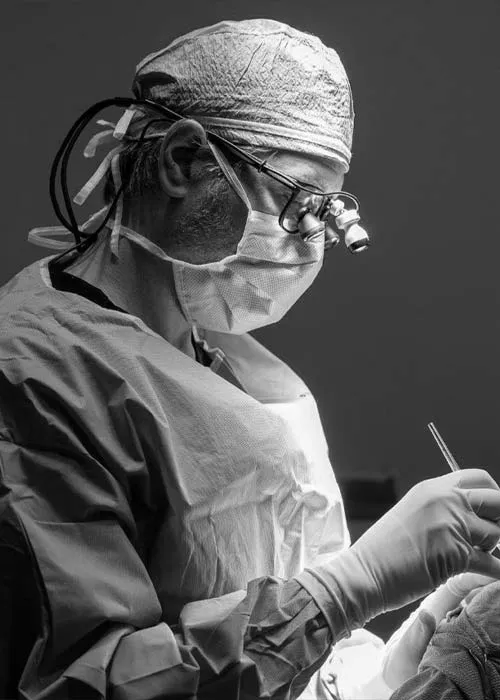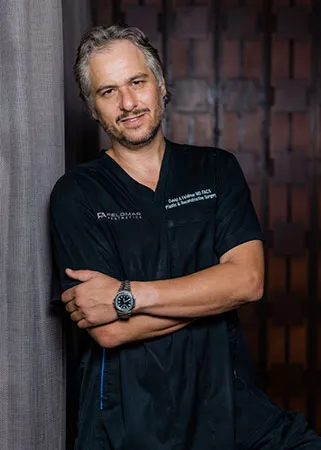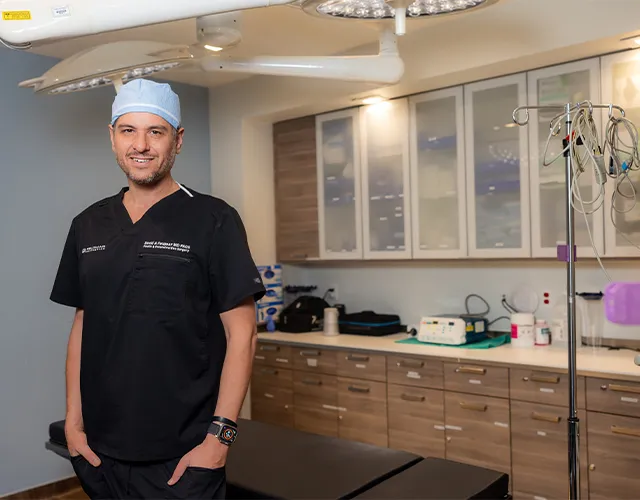


Reconstructive surgery is a specialized field focused on restoring function and appearance following trauma, illness, or congenital defects. Dr. David Feldmar, a double board-certified plastic surgeon, is committed to delivering exceptional care in multiple reconstructive procedures. His expertise spans wound care, breast reconstruction, treatment for hidradenitis suppurativa, and rectal cancer reconstruction.
Dr. David Feldmar offers advanced reconstructive procedures that restore form, function, and quality of life. Whether recovering from cancer, managing a chronic condition, or addressing physical trauma, each surgery is carefully personalized to support long-term healing and confidence.
For women undergoing mastectomy or lumpectomy, breast reconstruction helps restore both appearance and confidence. Dr. Feldmar offers personalized options—including implants, fat transfer, lifts, and tissue-based techniques like DIEP or TRAM flaps—to achieve natural, balanced results.
For patients living with HS, Dr. Feldmar performs surgical removal of inflamed tissue followed by reconstruction to reduce pain, prevent recurrence, and improve skin health and quality of life.
After rectal cancer treatment, reconstruction may be needed to restore bowel function and repair surrounding tissue. Dr. Feldmar uses advanced flap and graft techniques to rebuild the area, working closely with your oncology team for integrated care.

When injury, illness, or congenital conditions affect your body, reconstructive surgery can help restore function, confidence, and quality of life.
At MD Wound, Dr. David Feldmar and his experienced team combine advanced surgical expertise with compassionate care to deliver personalized, natural-looking results. Whether addressing complex wound closures or performing breast and soft tissue reconstruction, every treatment is tailored to your individual needs and goals.
Feel whole again—with expert care focused entirely on you.
Breast reconstruction is a vital step for many women after mastectomy or lumpectomy. Dr. Feldmar offers personalized surgical options to restore both form and confidence, with a tailored plan designed to meet each patient’s unique needs.
Silicone or saline implants are used to recreate the breast mound, offering a natural shape and feel. This option is popular for its predictable results and relatively short recovery time.
Fat is harvested from the patient’s own body—often the abdomen, thighs, or buttocks—and injected into the breast to enhance shape and volume. This technique results in a natural look and feel.
These procedures may be used to create symmetry, improve shape, or reduce discomfort. They can also address sagging or disproportionate size during reconstruction.
Flap surgery or medical tattooing techniques are used to recreate the nipple and areola, providing a natural and finished appearance to the reconstructed breast.
Autologous tissue techniques like the DIEP or TRAM flap use the patient’s own skin and fat to rebuild the breast. This method often offers a more natural texture and long-term result.
Hidradenitis Suppurativa (HS) is a chronic skin condition marked by painful nodules and recurring abscesses. When lifestyle changes or medications aren’t enough, surgery may offer lasting relief. Here’s how Dr. Feldmar helps patients manage HS through advanced surgical care.
In some cases, minimally invasive techniques are enough. In others, a more extensive surgical approach ensures the best outcomes.
Removes damaged skin and tissue where HS flare-ups most commonly occur.
Techniques such as skin grafts or flap surgery help restore healthy skin and minimize scarring.
Surgery can significantly reduce pain, inflammation, and discharge—improving daily comfort.
By addressing the root cause, surgery can lower the chances of future flare-ups.
Patients report improved quality of life, skin appearance, and emotional well-being.
Following rectal cancer treatment, some patients may need reconstructive surgery to restore both function and appearance. Dr. Feldmar brings surgical expertise and compassionate care to help patients heal fully—physically and emotionally.
Whether the goal is to repair post-surgical damage, restore bowel control, or improve appearance, Dr. Feldmar’s approach is personalized and collaborative—supporting every step of recovery.
Rebuilds damaged or removed tissue to restore support and functionality.
Advanced reconstructive techniques help cover wounds and support healing.
Tailored surgical approaches help improve control and reduce discomfort.
Dr. Feldmar works closely with your oncology team to ensure seamless, comprehensive treatment.
The goal is not just healing, but helping patients regain mobility, confidence, and daily comfort.
Recovery time varies depending on the specific procedure and individual patient factors. Dr. Feldmar will provide detailed post-operative care instructions to facilitate a smooth recovery.
As with any surgical procedure, reconstructive surgery carries some risks, including infection, bleeding, and complications related to anesthesia. Dr. Feldmar will discuss all potential risks and benefits during your consultation.
Yes, breast reconstruction is commonly performed after a mastectomy to recreate the breast mound and restore a natural-looking appearance. Various techniques, including implants and tissue reconstruction, are available.
Absolutely. Reconstructive surgery can significantly enhance both the functional and aesthetic aspects of the affected areas, leading to improved self-confidence and overall quality of life.
Wound care involves thorough assessment, debridement, and the use of advanced dressings and therapies to promote healing. For more complex cases, reconstructive surgery may be necessary to restore function and appearance.
Surgical treatment for hidradenitis suppurativa involves the excision of the affected tissue and reconstructive techniques to repair the area. This approach helps reduce recurrence and improve skin health.
Rectal cancer reconstruction may involve flap surgery, skin grafts, and other methods to rebuild the pelvic floor and surrounding structures, restoring normal function and appearance.
Yes, fat transfer involves harvesting fat from another part of the body via liposuction and transferring it to the breast to improve contour and volume, offering a natural look and feel.
Nipple reconstruction involves techniques, such as flap surgery or tattooing, to recreate a natural-looking nipple and areola, completing the breast reconstruction process.
Yes, Dr. Feldmar is a highly experienced reconstructive surgeon who stays at the forefront of surgical advancements to provide the best possible care for his patients.
If you have experienced trauma, illness, or a congenital condition affecting your appearance or function of a specific area of the body, a consultation with Dr. Feldmar can help determine if reconstructive surgery is right for you.
During your consultation, Dr. Feldmar will discuss your medical history, evaluate your condition, and recommend a personalized treatment plan tailored to your specific needs and goals.
Yes, reconstructive surgery can often be combined with other procedures to achieve comprehensive results, depending on the patient’s needs and overall health.
To schedule a consultation with Dr. Feldmar, contact our office today. Our team will be happy to assist you in arranging an appointment to discuss your reconstructive surgery options.
Dr. David Feldmar is a double board-certified surgeon in General and Cosmetic Surgery with a specialized focus in wound care. Known for his meticulous technique and compassionate approach, Dr. Feldmar leads a skilled team dedicated to treating complex, chronic, and post-surgical wounds. From managing diabetic ulcers and burns to performing advanced closures and graft procedures, his goal is to promote healing, prevent complications, and restore quality of life for every patient.
Whether at home or in a facility, Dr. Feldmar delivers expert wound care where it’s needed most—with a personalized, patient-first philosophy.






Our team delivers advanced wound care with surgical precision and a human touch—because healing is more than skin deep.
